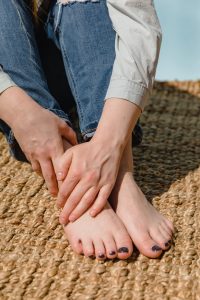From the type of shoes you wear and how many hours you stand in the day, to injuries and medical conditions such as plantar fasciitis; there are various causes of foot pain that many individuals experience on a daily basis. While these are some of the most common causes that first come to mind, a less obvious indication points to the spine.
You might think that the distance between the end of your spine and your feet is quite significant; however, there are nerves that originate from the lumbar spine (lower back), and run through the cauda equina before branching off to connect to the sciatic nerve. This means that there are quite a few spinal problems that can lead to pain in the legs and feet.
Located on both sides of the body, the sciatic nerve travels down from the hips to the knees and then branches off into nerve endings that terminate in the foot. When there is a problem that affects these spinal nerves, in particular, be it compression, irritation, or damage, foot pain is not an uncommon symptom to experience.
Let’s talk about some of these symptoms in a more detailed manner.
Common Symptoms of Foot Pain Related to the Spine

The most obvious indication that your foot pain is related to a problem in your lumbar spine is when you experience numbness and/or pain in your legs as well. Of course, among other tests and a thorough evaluation, your spine specialist will be able to identify what the underlying cause or condition is depending on the symptoms of your foot pain.
Common foot pain symptoms that are related to problems in the lumbar spine include the following:
- HEEL WALK: If you are having trouble raising the front part of your foot while walking (due to pain), this is known as heel walk because most of your body weight is borne by the heels. Quite often, this symptom is experienced along with numbness in the calves that travels down to the foot. Heel walk typically occurs when the sciatic nerve or connected nerves are compressed, irritated, or damaged.
- FOOT DROP: Similar to heel walk, individuals with foot drop will have trouble lifting the front of their foot, and experience problems with mobility and flexibility of the ankles as well. This is caused due to weakness or heaviness that restricts these specific foot movements. Another common symptom includes pain in the outer region of the calf that radiates downward, along the top of the foot. Foot drop is generally associated with an issue in the lumbar spine.
- INABILITY TO WALK ON TIPTOES: When there is an issue with a spinal root nerve that connects to the sciatic nerve, it can affect the muscle of the calf, causing pain that radiates between the heel and bottom of the foot. This makes it difficult and painful to walk on your tiptoes; raising your heels when walking can also be challenging.
Common Spinal Issues That Cause Foot Pain

Spinal dysfunction causes many different symptoms including pain-related symptoms in the back, legs, and feet. Conditions that pinch, irritate, or damage nerves, and/or cause the spinal canal to narrow, can all lead to foot pain. So, before you assume that the pain in your foot is due to standing for many hours or a longer than usual morning walk, take a look at these spine-related conditions that just might be responsible instead.
Herniated Disc
The spinal column has 23 vertebral discs that hold the spine together and absorb shocks owing to their sponge-like texture. When one of these discs gets compressed, it is known as a herniated or bulging disc; the effects of which include localised pain and/or pain that radiates down the leg, and to the feet. This generally occurs when fluid from the inner disc begins to leak, thereby causing nerve irritation that contributes to pain around the regions where present nerve roots are affected.
Sciatica
There are different root causes of sciatica, however, the most common one is a herniated disc. In some cases, a bone spur can also pinch one of the sciatic nerves while other causes that lead to compression or pinching of these particular nerves include diabetes and the development of a tumor. Since there are several muscles in the leg and foot that are connected to the spinal cord via the sciatic nerves, when they are irritated or compressed, the pain is often experienced in the legs and feet as opposed to the lower back alone.
Piriformis Syndrome
Located in the buttocks, the piriformis muscle helps stabilise the joints of the hips when raising and rotating the thighs. When the muscle spasms (known as piriformis syndrome), the pain is generally limited to the buttock region, however, if the spasms affect the sciatic nerve, it can cause typical symptoms related to sciatica. This includes numbness and pain in the legs that radiate down to the foot.
Leg Length Discrepancy
Contrary to what many believe or assume, the human body is not symmetrical; therefore, most people have a slight leg length discrepancy that is typically around 1 centimetre. Fortunately, in most cases, it does not affect one’s everyday life or cause any problems or pain in the body as they go about their regular life. On the other hand, if the body cannot compensate for a significant leg length discrepancy, it can affect the spine and lead to direct problems or pain in the feet. This is because the individual is forced to bear more weight with one foot, thereby causing heel pain, the development of bunions, and other related foot problems. As for the other foot, the muscles grow weaker which leads to its own set of problems.
If you are experiencing persistent or recurring pain in one or both feet, it is advisable to visit your doctor sooner rather than later. Early diagnosis of foot pain related to spinal issues is important for successful treatment of the underlying cause, and subsequent recovery. At MSK Therapy, we specialise in accurately diagnosing and treating foot pain, lower and upper back pain, neck pain, and other aches in the body using spinal manipulation and various other chiropractic techniques. Schedule an appointment with us today for a thorough evaluation, and allow us to get to the bottom of your foot pain so that we can help you do away with it!
